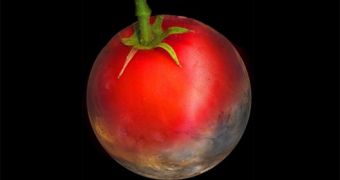Chinese scientists are planning for a vegetable planting mission on Mars and the moon, after preparatory tests were successfully completed in Beijing laboratories.
Four types of vegetables are to be planted in extra-terrestrial soil, The Huffington Post reports.
Their suitability for the project has been proved by an earthly experiment, led by scientists at the Chinese Astronaut Research and Training Centre in Beijing.
Selected vegetables were grown in an “ecological life support system,” a 300-cubic-meter device built in a way which makes possible the generation of water, food and air supplies by astronauts while on space expeditions.
“Chinese astronauts may get fresh vegetables and oxygen supplies by gardening in extra-terrestrial bases in the future,” said Deng Yibing, a scientist of the Chinese Astronaut Research and Training Centre in Beijing.
The project is the first of its kind to be developed by Chinese scientists and it's intended rather as a life supply meant to facilitate subsequent missions in space.
Recent events in the space industry on the global level, including the decrease of the United States influence in the field, allowed an unprecedented development of China's space projects.
China National Space Administration (CNSA) announced its first moon exploratory mission for next year, which is part of a long-term plan, including the construction of a permanent Chinese space station by 2020 and several missions on Mars and the moon.
Chinese officials also stated they were making plans for a future man landing on the moon, a success that has so far been registered only by the United States astronauts.
Yang Liwei, an astronaut whose 2003 successful space mission aboard Shenzhou 5 made China the third country in the world to have people launched into space, revealed Chinese astronauts' plans to establish a space Communist Party branch.
Despite China being several steps behind Japan, Europe and the US in the field of space technologies, if the current project succeeds, it has the chance to reach and even exceed their level.

 14 DAY TRIAL //
14 DAY TRIAL //